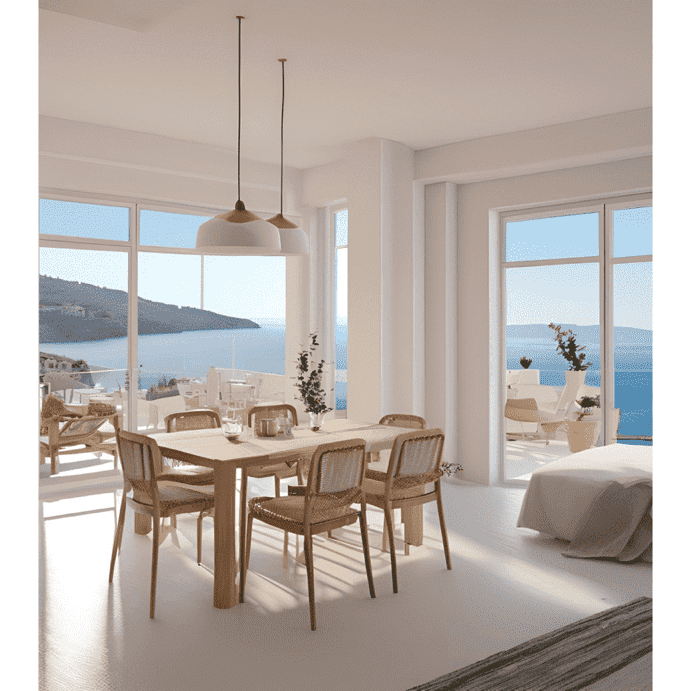Europe’s Luxury Real Estate Thrives Amid Corrections
Luxury real estate is experiencing a remarkable surge across Europe, defying the broader market trends. High-end hotels and prestigious shopping districts are thriving, buoyed by the burgeoning wealth of the global elite and a significant intergenerational wealth transfer from baby boomers to their offspring. This phenomenon has effectively mitigated the adverse effects of the property market correction instigated by rising interest rates, as detailed in a recent report by CBRE Group Inc.
Interestingly, the resilience of luxury properties stands in stark contrast to the challenges faced by high-end fashion, jewelry, and liquor brands, which have suffered from a downturn in Chinese travel and consumption, compounded by escalating trade barriers. Notably, LVMH has reported its most disappointing quarter since 2020, highlighting the complexities of the luxury market.
The rise in interest rates has prompted a notable retreat among institutional investors from commercial real estate, as they await a recalibration of valuations to align with the increased cost of capital. However, high-net-worth individuals and audacious private equity firms have seized what they perceive as a once-in-a-lifetime opportunity to acquire prime real estate in Europe at historically low prices, or to capitalize on rental yields poised for significant appreciation. Blackstone Inc., the preeminent private equity real estate investor globally, has made headlines by acquiring luxury retail spaces in London and Paris, marking a strategic pivot after years of reducing its retail property exposure. Its €1.3 billion ($1.4 billion) divestiture of a prestigious retail asset in Milan stands as one of its most lucrative transactions this year, as noted during an earnings call.
The relentless pursuit of prime retail locations by luxury brands has driven rental prices upward at an accelerated pace compared to those targeting mass-market consumers. According to CBRE’s data, rents on London’s New Bond Street have surged to nearly three times their 2010 levels, a stark contrast to the stagnation observed on Oxford Street, where rental growth has been minimal. A similar narrative unfolds in Paris, where the upscale Rue Saint-Honoré has outperformed Boulevard Haussmann by a significant margin.
Moreover, major hotel chains are aggressively vying to retain their most valuable clientele, resulting in a flurry of mergers and acquisitions among top-tier brands. This strategic maneuvering has been facilitated by the liberation of capital from their balance sheets, achieved through a transition to asset-light operational models. In terms of performance metrics, average daily room rates for luxury hotels in London have escalated by an impressive 42% over the four years leading up to 2023, outpacing the 27% increase observed in the broader market. Similarly, luxury room rates in Paris and Milan have surged by 42% and 60%, respectively, surpassing the 37% growth recorded in their respective wider hotel markets.
The Europe’s luxury real estate sector is not merely weathering the storm; it is thriving amidst adversity, showcasing a remarkable resilience that continues to attract discerning investors and affluent consumers alike.
Europe’s Luxury Real Estate Thrives Amid Corrections
Greece: Europe’s Fourth Cheapest Real Estate Market
Greece: Europe’s Fourth Cheapest Real Estate Market
Explore why Greece stands out as one of Europe’s most economical real estate markets, attracting savvy investors seeking value and opportunity.

Surge in Scottish Home Sales: UK Real Estate Update
Surge in Scottish Home Sales: UK Real Estate Update
Scottish home sales and enquiries surged in October, with a third of surveyors reporting the fastest growth in years, signaling a vibrant market.

Spain: A Leading Market in European Real Estate
Spain: A Leading Market in European Real Estate
Explore how Spain is becoming one of Europe's most promising real estate markets, excelling in retail, logistics, and hotel sectors for strategic growth.

Greece Real Estate Market: Rise of Serviced Apartments
Greece Real Estate Market: Rise of Serviced Apartments
Explore the growing demand for serviced apartments in central Athens, where integrated hospitality services attract savvy investors in the Greece real estate market.

Home Prices Hit by Climate Change, J.P. Morgan Warns
Home Prices Hit by Climate Change, J.P. Morgan Warns
J.P. Morgan analysts reveal a negative link between climate risk and home price appreciation. Explore the emerging trends and their impact.


